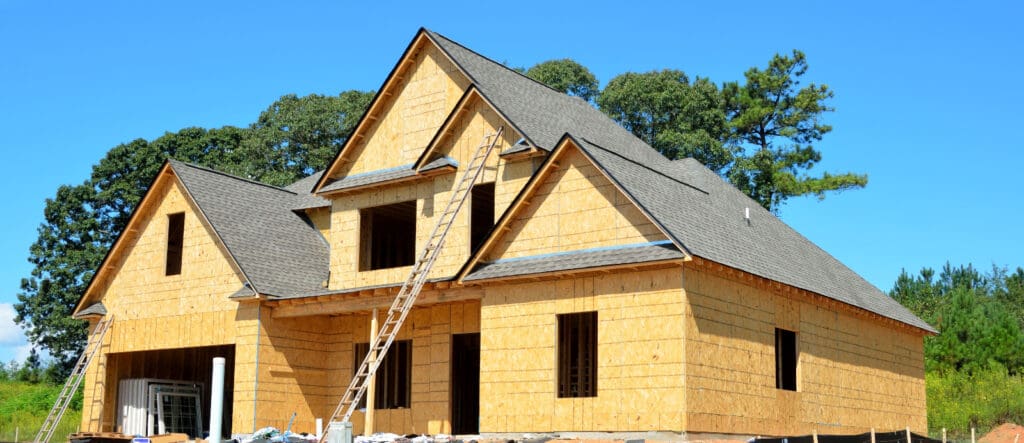
Updated on November 19, 2025
Composite roofing—also called composition roofing—is one of the most popular choices for residential roofs across the United States. It’s known for its durability, curb appeal, and cost-effective performance. But what exactly is composite roofing made of?
In this guide, we’ll walk through the materials, design, and features that define composite roofing systems. Whether you’re comparing roofing products or just trying to understand what’s over your head, this breakdown will help clarify what makes composite roofing such a versatile option.
What Are Composite Roof Shingles Made Of?
Composite shingles are made from a blend of synthetic materials, often engineered to replicate the look of asphalt shingles, wood shakes shingles, or even slate tiles—but with improved performance and longevity.
Common materials used in composite roofing:
- Reinforced fiberglass for strength and flexibility
- Recycled plastics and rubber for impact resistance
- Asphalt or polymer resins for waterproofing
- UV inhibitors and fire retardants for weather protection
This combination of materials creates a lightweight, tough, and weather-resistant shingle that can last up to 50 years or more, depending on the product line and installation.
What Types of Composite Roofing Are Available?
Composite roofing is available in a wide range of styles, designed to mimic traditional roofing materials without the downsides.
Popular types of composite roof styles include:
- Composite slate: Engineered to look like natural slate but lighter and more affordable
- Composite shakes: Designed to replicate hand-split cedar shakes without the fire or rot risk
- Dimensional or architectural shingles: Thicker than standard asphalt shingles with a more layered look
- Luxury or designer shingles: Premium composite options with enhanced texture and detail
These products fall under the broader category of composition roofs, a term that includes any shingle made from more than one material.
How Is Composite Roofing Different from Asphalt Shingles?
Composite roofing and asphalt shingles are often mentioned in the same breath—but there are key differences.
| Feature | Asphalt Shingles | Composite Roofing |
|---|---|---|
| Material | Asphalt-coated fiberglass | Mix of fiberglass, polymers, recycled materials |
| Lifespan | 15–30 years | Up to 50+ years |
| Appearance | Standard granule finish | Can mimic slate, wood, or tile |
| Weight | Lightweight | Still lightweight, but slightly heavier |
| Cost | Lower upfront cost | Higher upfront, lower over time |
If you want the look of slate or wood shake without the maintenance or weight, composite is a great solution.
Is Composite Roofing Made from Recycled Materials?
Yes—many composite roofing materials are manufactured using recycled plastics, rubber, or post-industrial waste. This not only helps divert waste from landfills but also gives the roofing product added strength and impact resistance.
Some brands specifically market their shingles as eco-friendly, and many meet sustainability certifications. If green building matters to you, composite roofing is often a smarter alternative to traditional clay tile or wood shake roofs.
How Long Does a Composite Roof Last?
With proper installation, a high-quality composite shingle roof can last anywhere from 30 to 50 years—sometimes even longer.
Many manufacturers back their products with lifetime limited warranties, offering added peace of mind.
Factors that affect lifespan include:
- Quality of the product
- Climate and weather exposure
- Proper ventilation and installation
- Maintenance habits
Compared to other types of roofing, composite roofs strike a great balance between long-term performance and visual appeal.
Are Composite Roofs Energy Efficient?
Yes—many modern composite roofing products are designed with energy efficiency in mind. Certain shingles are rated by ENERGY STAR® and include cool roof technology that reflects solar heat rather than absorbing it.
This can:
- Reduce attic heat buildup
- Lower cooling costs in summer
- Extend the life of your roof and HVAC system
Because composite shingles are lighter and more reflective than slate tiles or wood shake, they often outperform traditional materials in terms of thermal regulation.
How Much Does Composite Roofing Cost?
The cost of composite roofing varies based on brand, style, and local installation rates. On average, you can expect:
- $5–$12 per square foot installed
- Premium styles like synthetic slate may cost more
- Architectural or dimensional shingles typically fall in the mid-range
While composite roofing is more expensive than standard asphalt shingle roofing, it generally pays off in lower maintenance, longer lifespan, and better resale value.
Frequently Asked Questions
Is composite roofing better than asphalt shingles?
It depends on your needs. Composite roofing offers better durability, appearance, and lifespan than traditional asphalt—but it also comes at a higher initial cost.
Does composite roofing look like real wood or slate?
Yes. Many manufacturers offer composite shake or slate styles that closely resemble the texture and profile of natural materials, without the drawbacks like rot, warping, or heavy weight.
Is composite roofing a good choice in rainy climates?
Definitely. Composite shingles are designed to shed water efficiently and hold up well in wet or storm-prone areas. They don’t swell like wood or crack like clay tiles.
Can composite roofing be installed over an old roof?
In most cases, a tear-off is required to meet code and manufacturer warranty standards. Always consult a qualified roofing contractor for an evaluation.
Is composite roofing low maintenance?
Yes. Composite roofs don’t require the regular sealing or treatment that wood roofs do. Occasional inspections and cleanings are usually all that’s needed.
Ask Warner Roofing & Construction About Composite Roofing
If you’re considering composite roofing for your home, Warner Roofing & Construction can help you choose the right materials, explain the options, and ensure expert installation. Our team understands the differences between composite products and how to get the most value from your roof.
Reach out to Warner Roofing today to learn more about composite roofing—or any type of roofing that fits your home, style, and budget.
